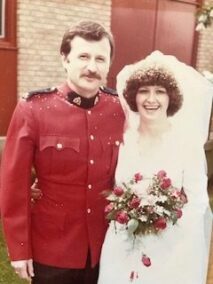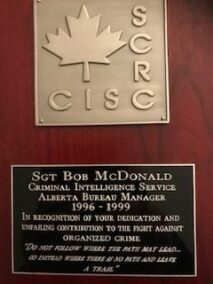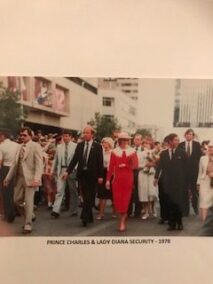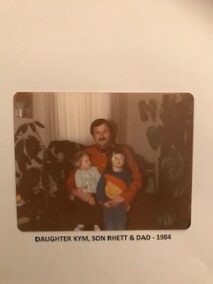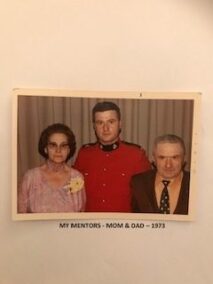Robert Harvey McDonald

Home Town: Strathclair, Manitoba
Training Division: “Depot”
Troop: TR. 15 1972/73
Regimental Number: 30113
Divisions Served: “A,” “K”
Medals & Honours: Long Service Medal with 25 Year Clasp
Pillar Location: Pillar VII, Row 33, Column E
Story:
I am one of three sons of Don and Gladys McDonald (nee Stockwell) raised on a family farm 5 miles southwest of Strathclair, Manitoba. My parents were loving guardians to me and my brothers Fred and Kenn. They were modest people who instilled positive qualities into our characters and assisted us in fulfilling our dreams. The relationship I enjoyed with my family was instrumental in the choices I made in life.
After completing high school in Strathclair, I worked several jobs in Strathclair, Brandon, and Winnipeg, however always had the yearning to be a Mountie. On February 21, 1972 I submitted an application at the RCMP Shoal Lake detachment. I was engaged into the Force in Brandon, Manitoba on November 08, 1972. I recall how humbled I was swearing Oaths of Allegiance, Office, and Secrecy, and that my starting salary would be a whopping $7600 /annum. I thought I had died and gone to heaven. That day I made the long drive to Regina, steeped in mixed thoughts and emotions.
Hereafter is a condensed summary of my RCMP postings and experiences over 29 years and 151 days:
Nov. 1972 – May 1973. Depot Division Basic Training, Regina. – I am best described as a ‘Manitoba farm boy.’ My driving instructor at Depot Division confirmed this after I made a driving error. He tossed his muskrat hat onto the vehicle dash, and in a theatrical fit of rage, glared at me and stated “McDonald you must be from the farm because you can’t drive on asphalt but you can sure drive on gravel roads”. The only response I could make was “Yes, Corporal”. I accepted all you can do is your best and must live with the consequences – a good lesson in life. Depot training reinforced the old cliché “you can’t please everybody all the time” – another good lesson in life. I recall the feeling of satisfaction I felt on graduation day (May 16, 1973) when I received my badge from the Depot Commanding Officer during the Passout Graduation Ceremony. I was pleased to be nominated to give the ‘Toast to the Parents’ at the celebration dinner. I will never forget the gestures of support and kindness I received from special guests I invited from small town Manitoba.
May 1973 – ‘A’ Division (Ottawa) Protective Services – Ottawa duties entailed security functions at Rideau Hall to protect the Governor General of Canada His Excellency Roland Michener, his family, entourage, various visiting dignitaries, and Rideau Hall property. In addition, duties entailed security related functions at 24 Sussex Drive (the Prime Minister’s official residence) to protect Prime Minister Pierre Elliott Trudeau, his family, entourage, visiting dignitaries and the Sussex Drive property. Other Ottawa duties entailed mobile responses to secure embassies and Government of Canada facilities in the Ottawa area.
August 1974 – Wetaskiwin City Detachment ‘K’ Division. I was required to complete six months of recruit field training at Wetaskiwin City Detachment. I was fortunate to have an excellent and experienced field trainer and colleagues in Wetaskiwin. I quickly learned the ins and outs of general duty policing at that location. I recall working on days off to gain experience and support shift members on night shifts and weekends. This was before paid overtime when members deemed it appropriate to lend a hand.
August 1975 – Bashaw Detachment ‘K’ Division. This was a three-person detachment where community-based policing was practiced before it was officially adopted as Force policy. The NCO i/c fully recognized the value from exercising positive relationships with citizens in the communities we served. The NCO i/c and his family resided in married quarters, and I in single member quarters. It was commonplace to work alone. The nearest support backup was approximately 20 minutes away and the detachment area was vast. On a regular basis I was included in Bashaw family functions, many of which were most graciously offered by the NCO and Senior Constable and their friends. That brought back memories of home.
May 1976 – Race Track Detail. This was a unique plain-clothes posting which involved having a federal law enforcement presence at licensed horse racing tracks in Alberta to enforce horse racing regulations. I worked in partnership with Canada Agriculture, and for the most part was positioned with track stewards overseeing racetrack operations. I was enthused when I pushed the button to electronically activate opening the gate to release the horses from the starting gate. I routinely witnessed the photo finish process to ensure integrity of the race winners was maintained. I assisted Canada Agriculture personnel in searching barns for unauthorized drugs or substances which may enhance horse performances. 1976 was the last year dedicated RCMP personnel were deployed to Race Track Detail as thereafter Agriculture Canada assumed full responsibility for regulating the race tracks.
October 1976 – Edmonton Drug Section. I was the most junior member posted to the Edmonton Section at the time. Emphasis was placed on developing intelligence, initiating investigations targeted on international and national drug trafficking organizations, and pursuing undercover operations. The posting provided a unique opportunity to pursue high level investigations utilizing modern investigative tools. Personnel were required to be informed on drug legislation, privacy laws, effective surveillance techniques, and human source handling policy. Court attendance was frequent and in itself a valuable experience. We worked closely with specialized sections, other police agencies and government agencies. I performed security duties at the 1978 Edmonton based Commonwealth Games and for dignitaries including Prince Charles, Lady Diana and the Pope. My experience on the Drug Section reinforced how important a role criminal intelligence plays in pursuing the law enforcement mandate. Henceforth, I would strive to direct my career towards the criminal intelligence field.
July 1980 – Edmonton International Airport Special Squad (EIASS). This was a specialized integrated plain clothes surveillance unit consisting of RCMP and Edmonton Police Service investigators. Officers were tasked with monitoring traveling criminals and crime suspects.
July 1982 – Edmonton Integrated Intelligence Unit (NCIS Cpl.). This was an intelligence unit wherein RCMP personnel partnered with Edmonton Police Service (EPS) personnel, gathered criminal intelligence and pursued tactical operations on a variety of Organized Crime and Extremist Groups or individuals.
March 1988- Calgary International Airport Detachment (CIA). This posting involved carrying out the responsibilities of one of the regular member watch commanders posted to the CIA following the Air India bombing when Airport Special Constable personnel at Canada’s International Airports were replaced by regular members. As a result of my experience at the CIA I was pleased to receive a suggestion award for recommending the development of a penalty index to accommodate the various provisions of the federal acts and regulations pertaining to airport policing to assist personnel who are not familiar with the legislation.
April 1991 – Edmonton Integrated Intelligence Unit (NCIS Sgt.) This was a return to conducting Organized Crime and Extremism intelligence investigations and performing supervisory duties in the absence of the S/Sgt. i/c EIIU.
August 1992- National Gaming Specialist Central Region, ‘K’ Division. This plainclothes position involved identifying and enforcing Criminal Code and provincial legislation laws involving illegal gambling activity. I formed a close working relationship with the Alberta Government Gaming Regulators. I was pleased to be invited to become a member of the Alberta Gaming Research Council, which worked with experts associated to the Alberta Gaming Research Institute. My role on the Council was to facilitate information sharing between the Law Enforcement Community and the Institute to assist in research studies focused on the positive and negative impacts of legalized gaming.
January 1994 – 2002 (retirement) – NCO i/c ‘K’ Division Criminal Analysis Section (DCAS). This posting provided the opportunity to fulfill my career objectives to assist in intelligence gathering, reporting, analyzing and sharing. Aside from supervising the ‘K’ Division analysts, I fulfilled the role of Manager, Criminal Intelligence Service Alberta Bureau operations (CISA). ‘K’ Division was recognized by Criminal Intelligence Service Canada (CISC) for amalgamating CISA operations into DCAS which facilitated greater overall intelligence awareness, sharing and efficiencies. I had the opportunity to oversee several RCMP and CISA intelligence data bank operations and for a period of time I performed some of the duties of the ‘K’ Division Intelligence Officer.
The experiences I gleaned from my RCMP service caused me to formulate my own personal thesis statement:
The ultimate in law enforcement is having the ability to detect and identify criminal activity that threatens human life, bodily harm or threatens the destruction of property and to take proactive measures to prevent the planned criminal acts from occurring. This can be achieved by having a strong intelligence gathering, analysis and sharing capability to facilitate an appropriate tactical response to eliminate or lessen the impact of the threat.
I am grateful to many RCMP personnel and external associates who I met during my service. Every day I learned something from those surrounding me. It is stated the RCMP is a close-knit family, which I support. Many looked out for me, provided valuable advice, and assisted me in fulfilling my aspirations.
On the 16 June 1979 I married the love of my life Myrna Ruth Johnson. Myrna was raised in Climax, Saskatchewan and has been tremendous support to me. During my RCMP service she made personal sacrifices while maintaining full-time employment. She was ‘The Second Man’ who was there for me and our children (Kymberly and Rhett) when duty called. Myrna knew when it was time to remove the family from the stresses of life. She held things together and made it enjoyable to come home to a loving family. I will forever be indebted to her for the sacrifices she made so I could pursue my Force responsibilities, ambitions and dreams. Police officers need a loving and stable family to come home to – another good lesson in life.

